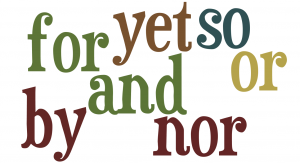 To boost your score for the IELTS Grammatical Range criterion, your essay is expected to contain a range of sentence constructions, from simple to compound complex.
To boost your score for the IELTS Grammatical Range criterion, your essay is expected to contain a range of sentence constructions, from simple to compound complex.
However, this does not simply mean that you need to equally represent these sentences in your IELTS writing and speaking.
This post tells you how by mastering the words of the coordinating conjunction of the English language you will have already done half of the work.
And will be well on your way to higher IELTS band scores.
Coordinating conjunctions are used for compound sentences
To explain a little further, by “range”, we mean the different kinds of sentence structure. Some of which recur more often than others.
Aside from compound-complex (which is the least common type in IELTS essays), the rest (simple, complex, and compound) really need to be mastered by any IELTS candidate, as examiners expect them to be used in IELTS writing and speaking.
Without coordinating conjunctions, you couldn’t construct compound sentences
How to use coordinating conjunctions correctly and effectively.
Here are some examples of different coordinating conjunctions which show how we can use them to construct compound sentences. You should remember that we can also use coordinating conjunctions to connect words and phrases.
For now, we will use them to combine two independent clauses which is also known as simple sentences.
Keep in mind the acronym FANBOYS which represents the seven coordinating conjunctions: for, and, nor, but, or, yet, and so.
1. For is used to express reason.
I needs to study hard, for I do not like to disappoint my parents.
2. And is used to combine two related ideas.
My mother is a doctor, and she has a clinic.
3. Nor is used to connect two negative ideas.
She cannot sing, nor can she dance.
Note: nor is immediately followed by the modal can before the pronoun I.
4. But is used to combine two contrasting ideas.
I like strawberries, but my sister dislikes them.
5. Or is used to combine two alternative ideas.
I will treat you for lunch, or I will buy you some snacks.
6. Yet is used express a new idea regardless of what the existing one suggests.
We failed in the exam, yet we need to move on and prepare for the retake.
7. So is used to express the effect or consequence of an action or idea.
They are still coming, so we need to wait.
One more thing to remember when using coordinating conjunctions
One important point to bear in mind when writing is that there should be a comma (,) before a coordinating conjunction.
Now that you have become familiar with all the coordinating conjunctions, the next best step to take is practise writing compound sentences.
Remember, it is never enough to just know. Doing completes the work.
Write, write, and write!
I hope you have found this post useful.
To your IELTS success,
Don Enricuso


Leave a Reply